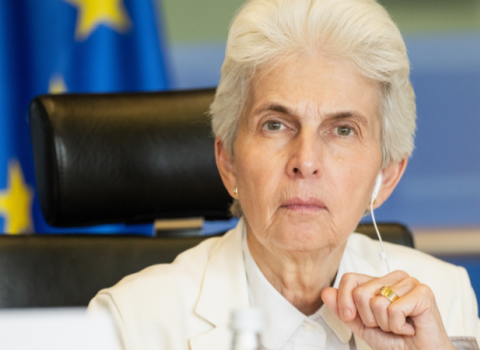Cutting overseas aid by 40% in favour of defence spending risks jeopardising the UK’s international standing, health sector warns

Photo credits: House of Commons / Flickr
Global health advocates and experts have warned that UK government cuts to overseas aid could threaten the country’s scientific leadership and collaborations.
In March, the Labour government announced plans to cut overseas development aid from 0.5% of gross national income to 0.3% by April 2027, a 40% decrease. It comes after the last Conservative government slashed aid from 0.7% to 0.5% in 2021, which at the time was billed as a temporary measure in response to the economic fallout from the COVID-19 pandemic.
In 2024, the UK spent around £14 billion on overseas aid, provisional figures show. Based on recent gross national income forecasts, cutting aid to 0.3% in 2027 would result in a total budget of £9.2 billion, or £6.1 billion less than a 0.5% target.
Such significant funding cuts erode trust, create uncertainty and are “very damaging to our international standing,” said Philippa Matthews, a researcher working on hepatitis B infection at London’s Francis Crick Institute.
“We are withdrawing commitment to active, running programmes delivering health and science which make a real-world impact on a daily basis,” she said. Matthews was one of several experts questioned by members of the House of Commons science, innovation and technology committee on September 9, as part of its ongoing inquiry into science diplomacy.
Matthews warned that several factors including funding cuts and barriers to mobility are already having an impact on the ability of institutes like hers to attract international talent. “We are struggling to recruit the quantity and calibre of applicants that we were, say, a decade ago,” she said.
During the meeting, Mike Podmore, chief executive of the StopAIDS advocacy network, said that although the UK had played a leading role in establishing key global health institutions over the last two decades, the country’s standing “started to falter” around the time of the pandemic.
In 2022, as a result of foreign aid cuts, the UK reduced its contribution to the Global Fund, a worldwide partnership to defeat AIDS, tuberculosis and malaria, from £1.4 billion to £1 billion over three years.
The UK has likewise reduced its contribution to Unitaid, a global initiative to make healthcare innovations available in low and middle-income countries, in recent years. “It means that we’re not making the connection to really translate the great innovation happening in the UK to really impact on the lives of the poorest around the world,” Podmore said.
Meanwhile, the 2020 merger of the Foreign and Commonwealth Office and the Department for International Development “created chaos for the UK’s standing internationally in a time of global crisis,” Podmore said.
The latest cuts have undermined the new government’s pledge to make health a priority, he said. “Now we wait to see what that will mean, in terms of the impact on how much the UK can contribute to these critical global health institutions and how it will affect its standing.”
Cuts not only in the UK but also in the US and in other countries represent an “existential crisis” for the global health sector, Podmore said. “The very fact the UK government was able to make such a massive cut in [aid spending] means that there is a really strong case to be made to the public and indeed to the government about why funding for overseas development aid is so important.”
Antimicrobial resistance
An early casualty has been the Fleming Fund, a UK programme supporting up to 25 countries in Africa and Asia to tackle antimicrobial resistance (AMR). In July, the government announced it will close the scheme.
“Nine years ago, we were probably the most front-footed [. . .] G7 country on trying to tackle AMR as a global issue, and whatever we do ourselves domestically on it, we can’t solve it if other people aren’t trying to solve it,” said economist Jim O'Neill, who chaired an independent review on AMR that presented its findings to the UK government in 2016.
Related articles
- UK targets Spain and Germany for new Horizon Europe collaborations
- UK looks abroad to improve its innovation economy
However, “our voice stopped on the topic sometime during the Theresa May government and has become increasingly dormant at the political level since,” O'Neill told MPs. He said it was “very disappointing” that political leaders no longer seem to recognise the importance of tackling AMR.
He echoed fears that this retreat from the global stage could make partners hesitant to trust the UK. “If some new secretary of state or prime minister came along and said, I want to make AMR a top global issue, I’m not sure the UK would get such a great hearing around the world,” he said.
UK competitiveness
Adrian Smith, the outgoing president of the Royal Society scientific academy, also criticised the lack of a joined-up international strategy as he shared his thoughts on the state of UK science with the House of Lords science and technology committee on September 9.
“You have noises about how we want to be terrific at science, so we want to attract the brightest and best from around the world, and then you invent a visa [sponsorship] system which is on average 17 times more expensive than any other country. It’s insane,” he said.
However, Smith said it was “gratifying” to see that, since the UK rejoined Horizon Europe, its researchers have been successful in winning grants. Last year, for example, UK scientists won more European Research Council Advanced Grants than any other country.
Smith also welcomed the government’s commitment in this summer’s spending review to invest £86 billion in science and technology until 2029-30, which he said provides “a degree of confidence to researchers and investors,” but warned the UK still lags behind other G7 countries in terms of spending.
“I think over the years science in this country, and policy, has been hampered by policy churn, stop-start investment,” he said. “During my five-year term, I’ve had introductory meetings with six science ministers.”





 A unique international forum for public research organisations and companies to connect their external engagement with strategic interests around their R&D system.
A unique international forum for public research organisations and companies to connect their external engagement with strategic interests around their R&D system.